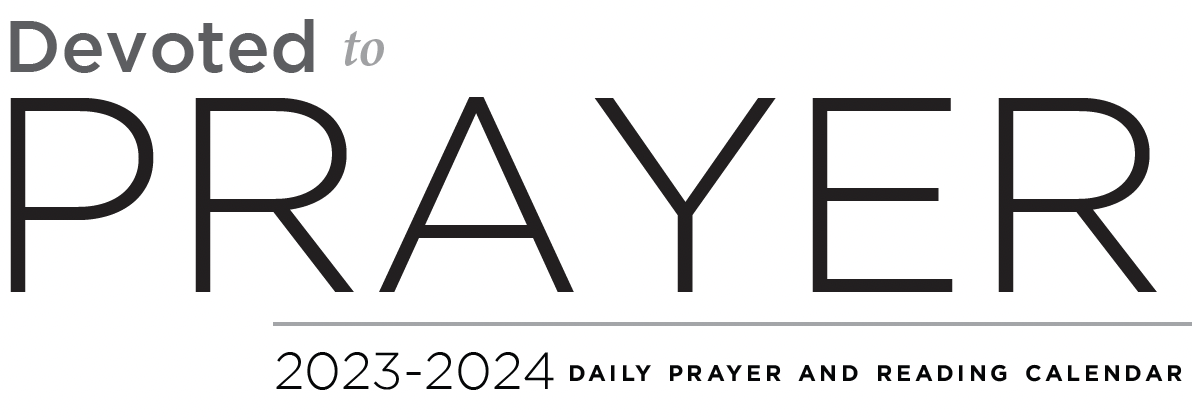

Monday of the First Week in Advent
One of the main themes of the Advent season is the coming of the Lord. We live in the tension of what Lutherans have identified as the “already, but not yet.” We are already children of God, but we are not yet fully with God. We live in the here and now, and yet we long for eternity. We are sinners and yet we are also saints redeemed by Christ. We think about the coming of Jesus as an infant, born in a stable in Bethlehem, and yet we also think about His return on the last day.
On that last day, or the “Day of the Lord,” as the prophets hailed it, we will all be judged for what we have done and what we have left undone. Sin and death have held us captive in this life no matter how hard we’ve tried to be “good.” We live in the tension between deserving judgment and receiving forgiveness. As the prophet Amos spoke the Word of the Lord to God’s people in the eighth century BC, he proclaimed God’s judgment against the Northern Kingdom of Israel. Denouncing their pride, lust, extortion, tyranny, and oppression of the needy, the prophet reminded his audience, and us, that no one will be able to save him or herself from the righteous judgment of the Lord. This includes, but is not limited to, all of us who call ourselves, “strong, mighty, swift, stoic, pure, or faithful.” As Paul said in the first century AD, “None is righteous, no, not one understands; no one seeks for God. All have turned aside; together they have become worthless; no one does good, not even one.”
In the face of sinful greed and blatant abuse of power, God reminded His people that He was the one who delivered them out of slavery in Egypt, and freed them from the tyranny of Pharaoh. He was the One who brought His people out of bondage and journeyed with them for 40 long years in the wilderness. It was He who gave them the Law, and a land to call their own.
Before there is redemption, there is judgment. God’s judgment on Israel is likened to an earthquake which is destruction from which no one can escape. Thankfully, this is not the end of the story and the prophet goes on in chapter 9 with the good news. “I will restore the fortunes of my people Israel and they shall rebuild the ruined cities and inhabit them…I will plant them on their land, and they shall never again be uprooted out of the land that I have given them” (Amos 9).
As we remember where we are today, on this first Monday of Advent, we recall that it was the Lord God of Israel who took on flesh and came to live among us as one of us, in order to save us from all that holds us captive. In Amos’ prophetic words we hear the promise of a Savior, sent into the world for the sake of salvation for all who believe. We know this Savior, He is the infant Jesus, the son of Mary. We worship this Savior; He is the Lamb of God who takes away the sin of the world. We follow this Savior, in trust and hope for the coming Day of the Lord, when all God’s children will be restored to Him—where death will be no more, sickness and pain will be no more, tears and weeping will be no more (Revelation 21). And, on that great and glorious day, we shall be judged righteous—not because of our merit, but because of our Savior’s.
[1] The Holy Bible: English Standard Version (Wheaton, IL: Crossway Bibles, 2016), Ro 3:10–12.
[2] Gary V. Smith, Amos, Mentor Commentaries (Fearn, Ross-shire, Great Britain: Mentor, 1998), 130.
Prayer: O Lord and Master Jesus Christ our God, who alone has power to absolve us from our sins, for you are good and love all, forgive all my transgressions done in knowledge or in ignorance, and make me worthy without condemnation to have communion of your divine and glorious and pure and life-creating mysteries. Amen. (St. John of Damascus—Today is his feast day)
Devotion written by the Rev. Dr. Amy C. Little
Morning Psalms
Evening Psalms
“John of Damascus, Priest, c. 760”

This daily prayer and Bible reading guide, Devoted to Prayer (based on Acts 2:42), was conceived and prepared by the Rev. Andrew S. Ames Fuller, director of communications for the North American Lutheran Church (NALC). After several challenging years in the midst of the COVID-19 pandemic, we have been provided with a unique opportunity to revitalize the ancient practice of daily prayer and Scripture reading in our homes. While the Reading the Word of God three-year lectionary provided a much-needed and refreshing calendar for our congregations to engage in Scripture reading, this calendar includes a missing component of daily devotion: prayer. This guide is to provide the average layperson and pastor with the simple tools for sorting through the busyness of their lives and reclaiming an act of daily discipleship with their Lord. The daily readings follow the Lutheran Book of Worship two-year daily lectionary, which reflect the church calendar closely. The commemorations are adapted from Philip H. Pfatteicher’s New Book of Festivals and Commemorations, a proposed common calendar of the saints that builds from the Lutheran Book of Worship, but includes saints from many of those churches in ecumenical conversation with the NALC. The introductory portion is adapted from Christ Church (Plano)’s Pray Daily. Our hope is that this calendar and guide will provide new life for congregations learning and re-learning to pray in the midst of a difficult and changing world.
